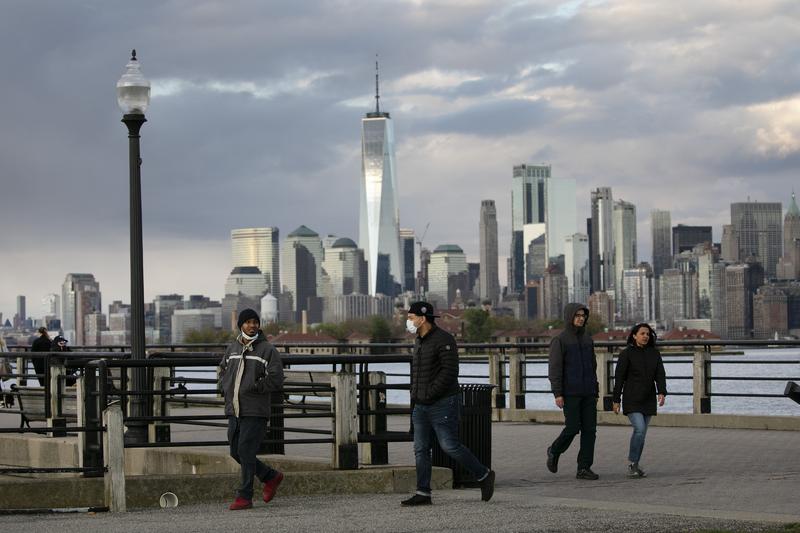 People maintain social distancing as they walk in Liberty State Park, May 11, 2020, in Jersey City, N.J., during the coronavirus pandemic. Behind them is some of the New York skyline. (MARK LENNIHAN / AP)
People maintain social distancing as they walk in Liberty State Park, May 11, 2020, in Jersey City, N.J., during the coronavirus pandemic. Behind them is some of the New York skyline. (MARK LENNIHAN / AP)
The United States is on the verge of a mental health crisis due to people's stress in hearing about daily death tolls from the coronavirus pandemic, along with weeks of isolation and social distancing, warned psychologists and mental health organizations.
COVID-19 in the US has forced people to stay inside, often alone, for three months, and has cost at least 30 million people their jobs.
Kevin Hassett, White House economic adviser, told CNN on Tuesday that the unemployment rate could hit 20 percent for April, which would be the highest on record
Kevin Hassett, White House economic adviser, told CNN on Tuesday that the unemployment rate could hit 20 percent for April, which would be the highest on record.
Bradley Klontz, an associate professor of financial psychology and behavioral finance at the Creighton University Heider College of Business in Omaha, Nebraska, told China Daily: "We know a lot about financial strain and its impact on mental health from studies. When people experience a lot of financial strain, it has a negative impact on relationships. It causes marital strain, depression and anxiety.
"Financial stress is actually a significant mortality risk factor akin to things like heart disease and diabetes," he said. "It has a profound impact on longevity and health overall and mental health."
Substance abuse
New York Governor Andrew Cuomo said at a press briefing on Friday that the virus had already caused serious mental health issues. "We're seeing the use of drugs go up. We're seeing alcohol consumption go up. This is a chronic problem," he said.
Michi Fu, a licensed psychologist, professor at Alliant International University and visiting professor of the National Taiwan University, told China Daily: "For people who already have a pre-existing condition, it's likely that their condition could be exacerbated (by COVID-19)."
More than half of those surveyed in a Kaiser Family Foundation poll said that the disruptions caused by the novel coronavirus had affected their mental health.
The Substance Abuse and Mental Health Services Administration, a branch of the US Department of Health and Human Services, said it had received 20,000 text messages from people in distress in April, compared with 1,790 the previous month.
Before the pandemic, at least 1 in 5 adults in the US suffered with mental health issues, but those numbers could rise, say experts.
"The longer this [pandemic] goes on, the higher the risk of long-term damage," Klontz said. "The economic impact can just get worse and worse, and being cooped up, unable to work, brings up a whole host of mental health challenges in and of itself.
ALSO READ: US deaths forecast to surge
"One of the primary risk factors for depression is social isolation, studies done on this show. And we are actually forcing and telling people they should socially isolate, which is the opposite of what you should be doing if you are trying to avoid being depressed."
Bearing the brunt
Amid the pandemic, those on the front lines have borne the brunt of the stress. At least two healthcare professionals have committed suicide.
Lorna Breen, medical director of a New York hospital emergency room, took her life in April.
John Modello, 23, a rookie emergency medical technician in the Bronx, also died by suicide.
In a joint letter to Congress in April, the National Council for Behavioral Health and the American Society of Addiction Medicine, ASAM, said that US$38.5 billion was needed to help its sector. An additional US$10 billion was needed just to help fight the fallout from COVID-19.
Paul Earley, president of the ASAM, which represents more than 6,000 physicians and clinicians in addiction medicine said: "Behavioral health organizations are battling two emergencies: the COVID-19 pandemic and an explosion of patients in crisis as a result of isolation, anxiety and economic distress.
READ MORE: US responsible for impasse over UN COVID-19 move, says China
"We must shore up our nation's addiction and mental health care systems now to stem the coming wave of acts of despair and unintentional overdose deaths."


